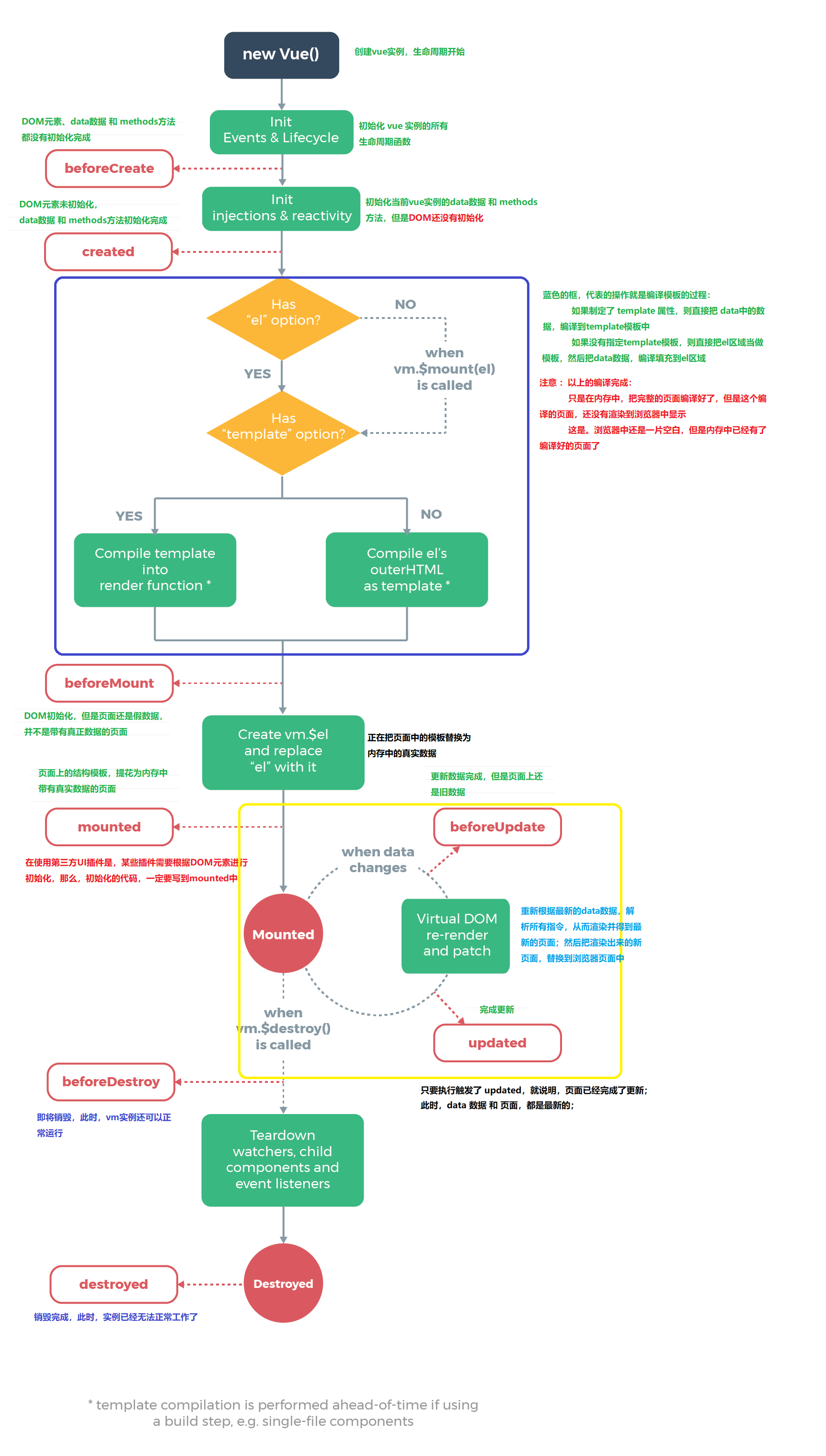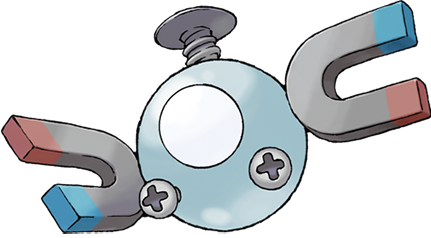vue基础
一、概览
1、vue 是一套构建用户界面的渐进式框架
npm安装命令:cnpm install --global vue-cli
也可以直接把vue.js下载下来在文件中直接引用;
每个 Vue 应用都需要通过实例化 Vue 来实现:
var vm = new Vue({ el: '选择器', data:{}, ... methods:{} });
2、helloworld
<!DOCTYPE html> <html> <head> <meta charset="utf-8"> <title>helloworld</title> <script src="F://vue.js"></script> </head> <body> <div id="vue_det"> <h1>title1 : {{header1}}</h1> <h1>{{helloworldMethod()}}</h1> </div> <script type="text/javascript"> var vm = new Vue({ el: '#vue_det', data: { header1: "helloworld !", alexa: "10000" }, methods: { helloworldMethod: function() { return 'helloworldMethod'; } } }) </script> </body> </html>
data 用于定义属性,实例中有三个属性分别为:site、url、alexa。
methods 用于定义的函数,可以通过 return 来返回函数值
computed 用于定义计算属性,定义同methods,但在调用时不用(),可直接以函数名调用;计算属性是基于它们的响应式依赖进行缓存的,而methods每次都会计算
watch 监听属性,可与v-model联合使用;
3、响应式
当一个 Vue 实例被创建时,它将 data 对象中的所有的属性加入到 Vue 的响应式系统中。当这些属性的值发生改变时,视图将会产生“响应”,即匹配更新为新的值;后期添加的属性不具备响应式属性,同Object.freeze(obj)方法使用后,obj里的属性也不具备响应式;
4、基本语法
vue使用了基于 HTML 的模板语法,允许开发者声明式地将 DOM 绑定至底层 Vue 实例的数据。
{{变量或方法}} 插入文本值: <p>{{ message }}</p>,通过使用 v-once 指令,你也能执行一次性地插值,当数据改变时,插值处的内容不会更新;<p v-once>{{ message }}</p>;
v-html 插入html代码: <div v-html="message"></div>
v-bind 设置属性,缩写:":",例: <div v-bind:class="{'class1': message}" //v-bind:class可缩写为:class,此处message是可选的,值为true或false,false就不显示此class1;从 2.6.0 开始,可以用方括号括起来的 JavaScript 表达式作为一个指令的参数,<a v-on:[eventName]="doSomething"> ... </a>
v-on 监听DOM事件,缩写:"@": <a v-on:click="doSomething"> //v-on:click可缩写为@click
v-model 用于input、select、text、checkbox、radio 等表单控件元素上创建双向数据绑定: <p>{{ message }}</p> <input v-model="message"> //写在input里的值会同时改变;
v-if 条件语句:<p v-if="seen">现在你看到我了</p> #seen为true时显示内容,否则不显示;可以使用 v-else 指令来表示 v-if 的“else 块”;2.1还新增了v-else-if
v-for 循环 <li v-for="message in messages">{{message.id}}</li> //messages可以为数字,messages也可以为object,用key,value,index同时或单独来取值,<li v-for="(value, key) in object"></li>
{{ message | filterA | filterB(1) }} 过滤器,filter为函数,可接受参数,message就是第一个参数,表示先用filterA处理message内容,接着用filterB处理;
filterA、B在传参时以filters属性来定义,例:filters:{filterA:function(agrv0){return 1}, filterB:function(agrv0,a){return a}}
二、修饰符
1、事件修饰符
<!-- 阻止单击事件冒泡 --> <a v-on:click.stop="doThis"></a> <!-- 提交事件不再重载页面 --> <form v-on:submit.prevent="onSubmit"></form> <!-- 修饰符可以串联 --> <a v-on:click.stop.prevent="doThat"></a> <!-- 只有修饰符 --> <form v-on:submit.prevent></form> <!-- 添加事件侦听器时使用事件捕获模式 --> <div v-on:click.capture="doThis">...</div> <!-- 只当事件在该元素本身(而不是子元素)触发时触发回调 --> <div v-on:click.self="doThat">...</div> <!-- click 事件只能点击一次,2.1.4版本新增 --> <a v-on:click.once="doThis"></a> <!-- 在 "change" 而不是 "input" 事件中更新 --> <input v-model.lazy="msg" > <!--将值转换为数值--> <input v-model.number="age" type="number"> <!--去掉首尾空格--> <input v-model.trim="msg"> <!-- 点击事件将只会触发一次 --> <a v-on:click.once="doThis"></a>
2、按键修饰符
<!-- 只有在 keyCode 是 13 时调用 vm.submit() --> <input v-on:keyup.13="submit"> <!-- 同上 --> <input v-on:keyup.enter="submit"> <!-- 缩写语法 --> <input @keyup.enter="submit"> 所有按键别名: .enter .tab .delete (捕获 "删除" 和 "退格" 键) .esc .space .up .down .left .right .ctrl .alt .shift .meta
三、组件(Component)
1、定义
组件可以扩展 HTML 元素,封装可重用的代码。
例:
<div id="app"> <mycomponent></mycomponent> </div> <script> // 注册 Vue.component('mycomponent', { template: '<h1>自定义组件!</h1>' }) // 创建根实例 new Vue({ el: '#app' }) </script>
以上<mycomponent>为全局可用,也可以在实例Vue时以components属性来实现局部属性
2、prop
prop 是父组件用来传递数据的一个自定义属性
例:
<child message="hello!"></child> // 注册 Vue.component('child', { // 声明 props props: ['message'], // 同样也可以在 vm 实例中像 "this.message" 这样使用 template: '<span>{{ message }}</span>' }) // 创建根实例 new Vue({ el: '#app' })
prop 是一个对象而不是字符串数组时,它可包含验证要求
例:
props: { // 基础类型检测 (`null` 意思是任何类型都可以) propA: Number, // 多种类型 propB: [String, Number], // 必传且是字符串 propC: { type: String, required: true }, // 数字,有默认值 propD: { type: Number, default: 100 }, // 数组/对象的默认值应当由一个工厂函数返回 propE: { type: Object, default: function () { return { message: 'hello' } } }, // 自定义验证函数 propF: { validator: function (value) { return value > 10 } } } type值有:String Number Boolean Function Object Array (type 也可以是一个自定义构造器,使用 instanceof 检测)
3、组件之间通信
//vue原型链挂载总线 Vue.prototype.bus = new Vue(); //子组件发送数据 this.bus.$emit("change",data); //子组件接收数据 this.bus.$on("change",function(data){ }) 自定义事件写在methonds属性中
4、slot-scop 插槽(示例)
<!--组件内容--> <template> <!--如果不指定name属性,则默认为default--> <slot name="action" v-bind:row="scope.row"></slot> </template> <!--调用方式--> <template v-slot:action="{row}"> <!--row这里接收参数处也可以不加花括号,但收到的参数会多包一层object--> <el-button size="small" @click="handleEdit2(row)">编辑2</el-button> </template>
5、自定义指令
// 注册一个全局自定义指令 v-focus Vue.directive('focus', { // 当绑定元素插入到 DOM 中。 inserted: function (el) { // 聚焦元素 el.focus() } })
可以在实例使用 directives属性 选项来注册局部指令,这样指令只能在这个实例中使用
6、钩子
类似于TestNG中after,before之类功能的函数;
7、路由:router
Vue.js 路由需要载入 vue-router 库,路由允许我们通过不同的 URL 访问不同的内容。
路由传参 params 与 query两种方式的区别,query的参数类型于get请求会写到url上,params方式不会
this.$router.push({ name: 'testCase', params: {interfaceId : val.id}}) this.$router.push({path: 'scyProblemDetailHtml', query: {problemId: row.id}}) <router-link :to="{name: 'scyProblemDetail', params: preParams}"> 参数接收:let interfaceId = this.$route.params.interfaceId;
(1)基础例子
<script src="https://unpkg.com/vue/dist/vue.js"></script> <script src="https://unpkg.com/vue-router/dist/vue-router.js"></script> <div id="app"> <h1>Hello App!</h1> <p> <!-- 使用 router-link 组件来导航. --> <!-- 通过传入 `to` 属性指定链接. --> <!-- <router-link> 默认会被渲染成一个 `<a>` 标签 --> <router-link to="/foo">Go to Foo</router-link> <router-link to="/bar">Go to Bar</router-link> </p> <!-- 路由出口 --> <!-- 路由匹配到的组件将渲染在这里 --> <router-view></router-view> </div> // 0. 如果使用模块化机制编程,导入Vue和VueRouter,要调用 Vue.use(VueRouter) // 1. 定义 (路由) 组件。 // 可以从其他文件 import 进来 const Foo = { template: '<div>foo</div>' } const Bar = { template: '<div>bar</div>' } // 2. 定义路由 // 每个路由应该映射一个组件。 其中"component" 可以是 // 通过 Vue.extend() 创建的组件构造器, const routes = [ { path: '/foo', component: Foo }, { path: '/bar', component: Bar } ] // 3. 创建 router 实例,然后传 `routes` 配置 const router = new VueRouter({ routes // (缩写) 相当于 routes: routes }) // 4. 创建和挂载根实例。 // 记得要通过 router 配置参数注入路由, // 从而让整个应用都有路由功能 const app = new Vue({ router }).$mount('#app') // Home.vue export default { computed: { username() { // 通过注入路由器,我们可以在任何组件内通过 this.$router 访问路由器,也可以通过 this.$route 访问当前路由 return this.$route.params.username } }, methods: { goBack() { window.history.length > 1 ? this.$router.go(-1) : this.$router.push('/') } } }
(2)动态路由
routes: [ // 动态路径参数 以冒号开头 { path: '/user/:id', component: User } ] /user/foo 和 /user/bar 都将映射到相同的路由,而且会自动添加一个参数id到this.$route.params,对应的值就是'foo','bar'; 模式 匹配路径 $route.params /user/:username /user/evan { username: 'evan' } /user/:username/post/:post_id /user/evan/post/123 { username: 'evan', post_id: '123' } history router.replace() 功能和router.push()类似,但它不会向 history 添加新记录 router.go(n) 在 history 记录中向前或者后退多少步,正数是向前,负数向后 const router = new VueRouter({ routes: [ { path: '/a', redirect: '/b' }, //重定向 { path: '/a', redirect: { name: 'foo' }}, //重定向 { path: '/a', redirect: to => { // 方法接收 目标路由 作为参数 // return 重定向的 字符串路径/路径对象 }}, { path: '/a', component: A, alias: '/b' }, //别名 ] })
四、其他
1、methods内方法调用this指向问题;
methods: { funA(){ console.log(this.hello); }, funB(){ console.log(this.hello); }, funC(that){ console.log(that.hello); }, fun(){ //方式一 this.funA(); //方式二 this.$options.methods.funB.bind(this)(); //方式三 var that = this; this.$options.methods.funC(that); } }
2、侦听watch
例
data: { question: '', answer: 'I cannot give you an answer until you ask a question!' }, watch: { // 如果 `question` 发生改变,这个函数就会运行 question: function (newQuestion, oldQuestion) { this.answer = 'Waiting for you to stop typing...' this.debouncedGetAnswer() } }
3、API
相关实例属性
vm.$data === data // => true vm.$el === document.getElementById('example') // => true vm.$props vm.$options vm.$parent vm.$root vm.$children vm.$slots vm.$scopedSlots vm.$refs vm.$isServer vm.$attrs vm.$listeners
附:生命周期图

可参考文章: vue组件间通信六种方式



